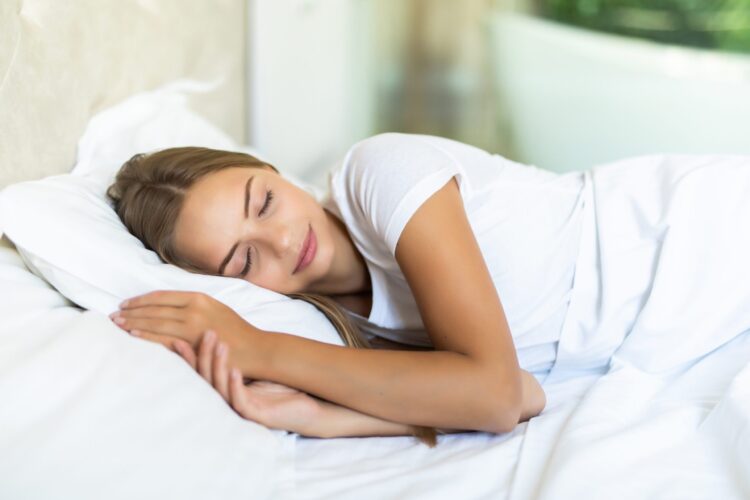While you’re fully aware that good rest makes you feel your best, it’s often hard to achieve. The National Heart, Lung, and Blood Institute shares data from the Centers for Disease Control that indicate “about 1 in 3 adults in the United States reported not getting enough rest or sleep every day.” Even more concerning is that “an estimated 50 to 70 million Americans have chronic, or ongoing, sleep disorders.” Proper rest is especially vital if you’re in recovery, as better sleep hygiene helps you manage relapse triggers more effectively. We have some tips that can help.
We’re So Tired! So Why Aren’t We Sleeping?
Here’s a surprising fact: according to sleep scientist Matthew Walker, “Human beings are the only species that deliberately deprive themselves of sleep for no apparent gain.” In an interview with NPR, he added that while many of us think we can always make up for our “sleep debt,” it doesn’t work that way.
“Sleep isn’t like the bank…I give you all of the sleep that you want—however much you wish to consume—and you never get back all that you lost. You’ll sleep longer, but you’ll never achieve that full eight-hour repayment, as it were. So the brain has no capacity to get back that lost sleep that you’ve been sort of lumbering it with during the week in terms of a debt.”
What’s worse, many people struggle with insomnia: between 30 and 80 percent, according to some studies. Insomnia often causes lethargy, fatigue, mood disturbances, difficulty concentrating, and decreased performance in daily activities.
People with insomnia may have trouble:
- Falling asleep
- Returning to sleep
- Staying asleep
This is a particular problem for people in recovery because of a previous disruption to your circadian rhythm, and the recalibration of it and other systems after treatment. Over time, with professional help and proper sleep hygiene practices, the problem usually resolves.
Insomnia isn’t the only reason for sleep loss, though. Cedars-Sinai indicates that there’s a “family of 90 conditions that affect sleep cycles and depth.” But here are some of the most common sleep disturbances:
- Circadian rhythm disorders
- Movement disorders
- Narcolepsy or too much sleep
- Parasomnias, such as sleepwalking
- Sleep apnea, caused by breathing and choking issues that deprive you of oxygen
These disorders frequently require special equipment and therapy to remedy, so if you’ve noticed anything out of the ordinary, schedule an appointment with a sleep medicine specialist.
How to Improve Your Sleep Hygiene
Lifestyle factors are also culprits robbing you of sleep. So here are some different methods to help you focus on better rest. Be patient: it usually takes a couple of months of routine before you feel more refreshed.
- Create a Sleep Haven
This includes a room temperature of 60–67 degrees; comfortable mattress, pillows, and linens; less clutter; and no extra lights. Some people even use darkening shades, ear plugs, and eye masks to prompt a more cozy atmosphere.
- Get More Exercise
Consistent movement for wellness, especially in the moderate-to-vigorous zone, at least five days a week helps you fall asleep faster and not wake up as frequently. Just make sure not to work out an hour before bedtime or lose sleep to fit it into your morning.
- Avoid Heavy Meals
Allow for two-to-three hours to digest before heading off to bed. Part of your physiological recovery during sleep includes proper digestion. If your system is working too hard to process your last meal, you’ll be more restless.
- Establish a Bedtime Ritual
Cue your mind and body that it’s time to rest with different things, such as reading a non-electronic book or magazine, journaling, meditation or another calming activity, an inspirational podcast, a spiritual check-in or gratitude list for the day—whatever prompts your brain to know it’s time to wind down and prepare for sleep.
- Eliminate Distractions
Shut off all electronics at least 30 minutes before bedtime. Even though some people find a familiar show or simply the background noise comforting, the blue light emissions from a TV disrupt your sleep cycle over time. The same goes for scrolling social media or going down internet rabbit holes on your phone or tablet. If you really need sound to help you drift off, consider a sleep meditation or a sound machine.
- Follow Your Sleep/Wake Cycle
Follow a similar rest schedule, even on off-days. This is probably the hardest habit to create, because who doesn’t like to stay up late or sleep in when they can? But a consistent wake-up and bedtime routine helps orient your natural circadian rhythms. Use the Sleep Foundation’s bedtime calculator to see how to set your schedule.
If you’re curious about the nature of your sleep/wake cycle, also known as your circadian rhythm or chronotype, take this quiz. Understanding more of your natural sleep tendencies is another way to improve sleep hygiene. While work, family, and other responsibilities might make it challenging to adhere to your body’s preference, you’ll at least have more information to make a good plan.
Enhance Your Wellness for Life at Great Oaks
At Great Oaks Recovery Center outside of Houston, Texas, we understand that you’re much more than a diagnosis. Our board-certified professionals design treatment solutions based on whole-person wellness: mind, body, and spirit. We want to give you all the tools necessary to build a healthier life in recovery. If you’re ready for this type of quality care, talk to a member of our admissions team today.



